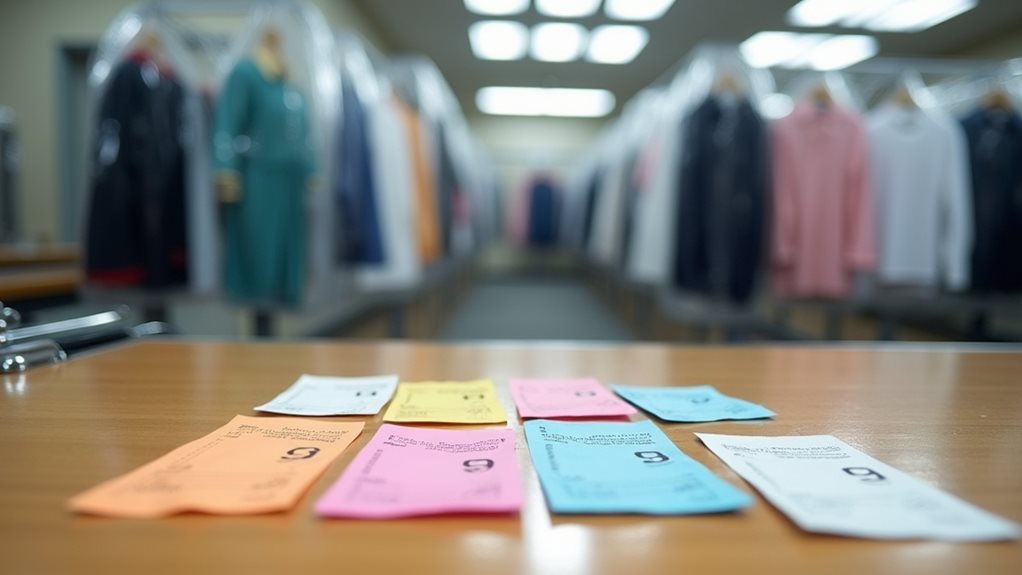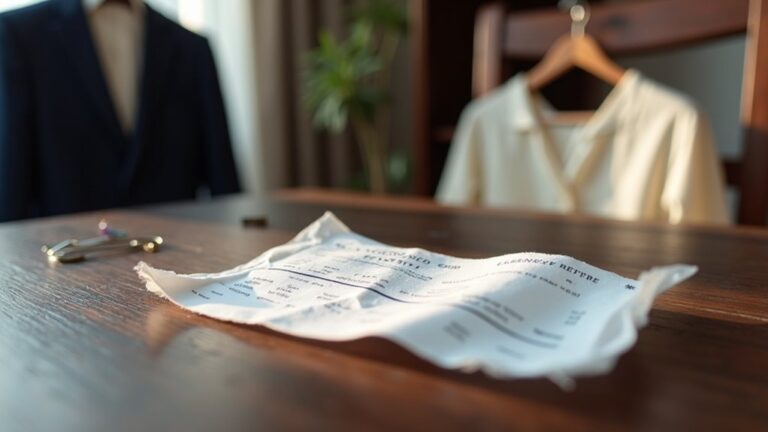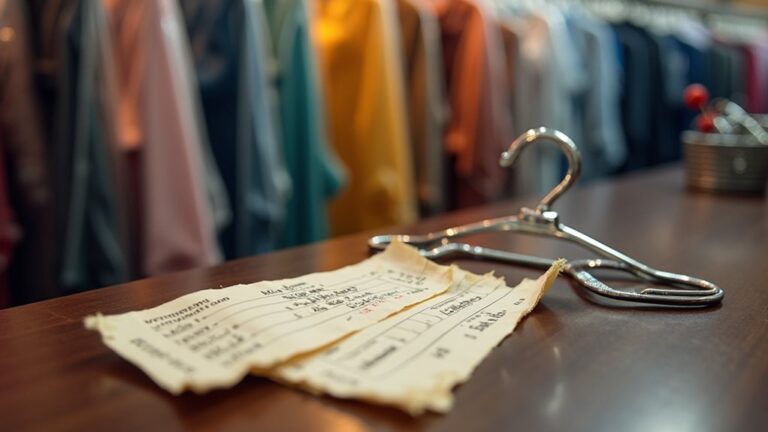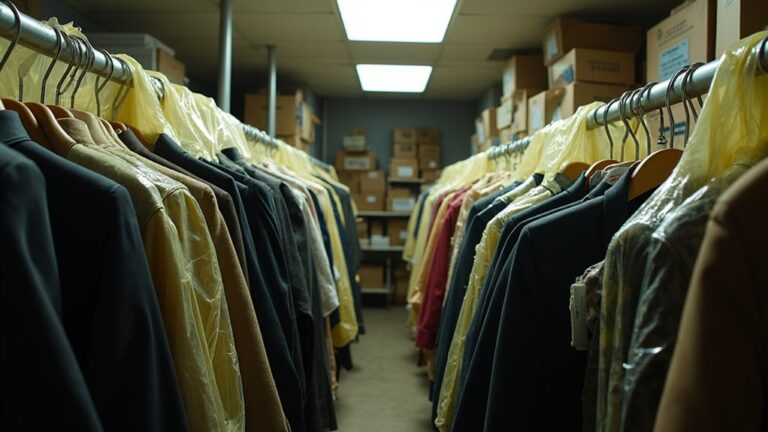You can absolutely pick up your dry cleaning without that pesky ticket, though you’ll need to bring a government-issued ID and be ready to describe your garments in detail. Most modern cleaners have moved beyond paper tickets anyway, using phone numbers or email addresses to track orders through digital systems. While some high-volume shops might hesitate without proper documentation, explaining your situation politely usually works. There are several strategies that can make this process even more seamless.
What Happens When You Lose Your Dry Cleaning Ticket
Why does losing that tiny slip of paper feel like losing the keys to your entire wardrobe? When you misplace your dry cleaning ticket, you’re suddenly faced with a frustrating reality that most dry cleaners rely on these little receipts as their primary system for reuniting you with your clothes.
Without that ticket, the retrieval process becomes considerably more complicated, and you’ll likely find yourself explaining your situation to skeptical clerks who’ve heard every story imaginable.
Most establishments will ask for identification, like your driver’s license, to verify you’re the actual owner of those garments. However, even with proper ID, some dry cleaners might still hesitate to release your items, leaving you in an awkward negotiation over your own clothes.
This situation becomes even more stressful if you need your garments for same day service, as many dry cleaners have cutoff times for expedited orders and may be less flexible about releasing items without proper documentation when time is critical.
Alternative Identification Methods Accepted by Most Cleaners

Although that missing ticket might make you feel like you’re trying to prove your identity to enter a secret club, most dry cleaners have actually developed surprisingly flexible systems to help customers retrieve their clothes without that crucial slip of paper.
You’ll find that alternative identification methods work surprisingly well – your driver’s license or government-issued ID can verify ownership just as effectively as that crumpled receipt.
Many cleaners now offer ticketless retrieval through customer phone numbers or email addresses linked to your order, making the whole process feel invigoratingly modern.
Modern dry cleaners embrace digital convenience by tracking orders through phone numbers and email addresses, finally ditching those easily-lost paper tickets.
Some forward-thinking establishments have adopted electronic records, allowing you to confirm your identity through their app or website, which honestly makes me wonder why we ever relied on those tiny paper slips in the first place! 📱
Be prepared to provide detailed descriptions of your garments, including fabric type, color, and brand, as this information helps cleaners verify your lost ticket policy claim when alternative identification methods are used.
How Modern Dry Cleaning Systems Track Your Orders
When I first discovered how sophisticated modern dry cleaning tracking systems have become, I honestly felt a bit like I’d been transported into some retail technology wonderland where everything just works seamlessly behind the scenes.
Your dry cleaning service now uses electronic tracking that’s honestly more advanced than some hospitals I’ve visited 😅. When you drop off your favorite blazer, they scan it into their system, creating a digital fingerprint that follows your garment through every step.
Customer identification happens through your phone number, email, or even a quick driver’s license check. The beauty of modern order tracking means you can literally walk in empty-handed, and they’ll still locate your items faster than you can say “business casual.”
This advanced tracking is especially valuable since dry cleaning uses chemical solvents instead of water to clean delicate fabrics, making it crucial to monitor each garment’s specific treatment throughout the process.
Steps to Take Before Attempting Pickup Without a Ticket

Even with all this fancy tracking technology working behind the scenes, you’ll still want to do some detective work on your end before showing up at the counter with nothing but hope and a winning smile.
First, contact the establishment to understand their specific policies—some dry cleaners are surprisingly flexible, while others guard clothes like Fort Knox 🏰.
Gather your personal identification and jot down unique details about your items: that mysterious stain on your blazer, the missing button, or the fact that your pants are hemmed unusually short.
I’ve learned that remembering these specifics can turn a skeptical clerk into your best friend, transforming what could be an awkward conversation into a seamless transaction that gets you reunited with your clothes.
Be prepared to provide your approximate drop-off date, as staff can use this information along with your account information to search their system and locate your order.
When Dry Cleaners May Refuse Service Without Proper Documentation
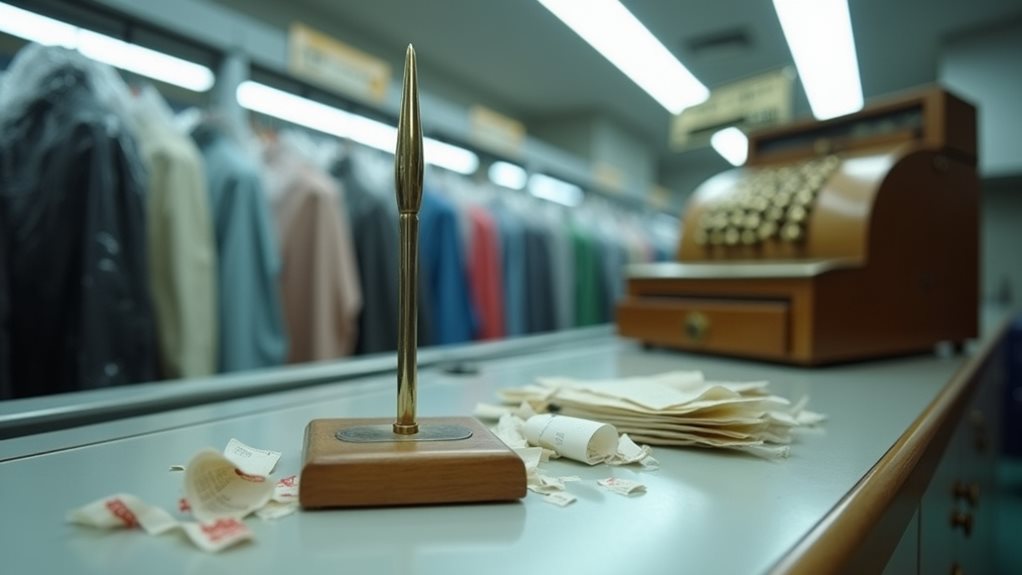
Envision this frustrating scenario: you walk into your neighborhood dry cleaner with confidence, ready to collect your favorite suit, only to watch the employee’s expression shift from helpful to hesitant the moment you mention you’ve lost your ticket.
Unfortunately, many establishments will flat-out refuse service without proper documentation, and honestly, you can’t blame them. High-volume cleaners process hundreds of garments daily, making it nearly impossible for staff to remember every customer’s face or specific items.
Even offering your driver’s license for identification doesn’t guarantee successful retrieval – policies exist to protect both you and the business from potential mix-ups or fraudulent claims. When someone else could theoretically claim your belongings, dry cleaners prioritize caution over convenience.
Additionally, time pressures compound this issue since most cleaners only hold finished garments for 30-60 days, after which unclaimed items may be donated to charity or disposed of according to their specific policies.

